Economic uncertainty, sudden changes in our routines, and fears of illness can all cause our stress response to skyrocket. Here are four ways to decrease your stress without having to leave your home. Learn why our brains create stress, signs your stress is too high and the ways to create healthy habits that effectively reduce stress.
what is Stress and Why You Shouldn't ignore it?
What is stress? The habitual reaction of the automatic "reptilian" brain reacting as if there is present and urgent danger is what creates chronic stress. In the last thirty years mental and brain health sciences have come to understand that this part of the brain becomes habituated to reacting as if situations are life-threatening even when they aren't. This part of the brain takes a few cues from the environment and assumes an over-exaggerated the level of danger, and react with the stress response: run, punch or play dead. The stress reaction is also known as the fight-flight-freeze response. These are the most important reactions when the danger is imminent, ie, happening NOW and life endangering.
None of these reactive strategies are helpful when we need to respond thoughtfully to an on-going concern that is multi-faceted. For things like preparation for working from home, keeping our children safe and occupied, learning what are the appropriate safety measures to be taking, we need to actually be in a brain state called "regulation." We know this as being calm, able to focus, sleeping, thinking strategically and logically.
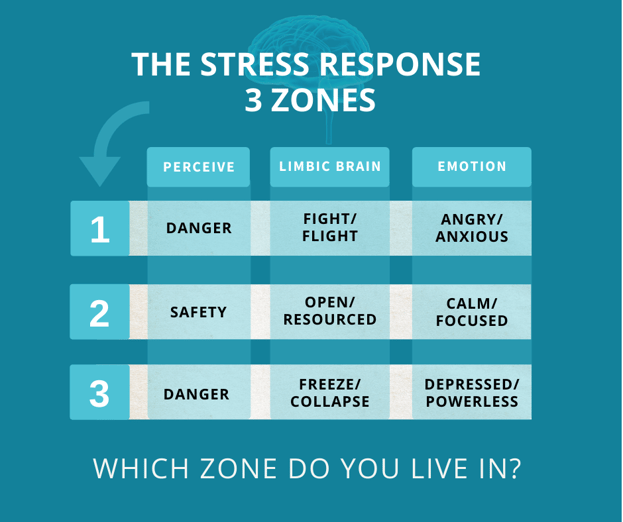
Stress is our body’s bio-physiological reaction to perceived stressors. Stressors are information that are registered as threat or danger to our immediate well-being and survival. The brain communicates to the body's different systems to make changes through hormones, muscle tone, breathing, the digestive system, to be in alignment with the perceived danger and how the body may need to react to stay safe. This information may be from ourselves or our environments, which can range from simple daily challenges to serious life-threatening events, but the key is that the body responds to as in the category of "threat/danger," which it may or may not actually be in.
Often the body going into a stress response is based on perception, or rather mis-perception, rather than what is actually happening. For example, being told that we need to work from home because we need to keep the community safe during a virus outbreak is a low threat to our physical safety. But we often hear the message as we are not safe and could immediately become sick and needing hospitalization. Unfortunately our bodies will often produce stress hormones in amount and longevity that reflect the latter rather than the former event. We call this habit chronic stress.
The effect stressors have on our health depends on the way we react to it and whether we are able to reset back into a relaxation response. In a perceived highly dangerous situation, our ‘fight or flight’ reaction is triggered by the brain. Hormones such as cortisol and adrenalin (so-called ‘stress hormones’) are released, blood rushes to specific muscles (to enable us to fight against or flee from an enemy) and we feel a burst of energy and strength. This response is useful when we are up against a real threat, however, when it is invoked when we are not actually in immediate danger, it has detrimental effects on our health and mental well-being long-term.
READ MORE IN THIS RESEARCH:
What Causes Stress?
The long-term effect of chronic stress causes wear and tear on the body and emotional wellness. The Centre for Disease Control and Prevention of the United States estimates that stress account about 75% of all doctors visit. Health problems related to stress include:
- Digestive issues. Stomach aches are common due to a slow down in the emptying of the stomach and diarrhea due to more activity in the colon.
- Weight gain. Increase in appetite and craving comfort foods , which can lead to weigh gain.
- Immune system. Weakening of the immune system so that you are more likely to have colds and other infections. Listen to a podcast interview with Immunologist, Dr. Calabrese on How to Boost Your Immune System
- Mental health. Anxiety, depression, loss of sleep and lack of interest in physical activity. Memory and decision-making can also be affected.
- Cardiovascular health. Increase in blood pressure, heart rate, and blood fats as well as increase in blood sugar levels, all of which are risk factors for heart disease, atherosclerosis and stroke, as well as obesity and diabetes.
Signs of Stress - How do you know you’re stressed out?
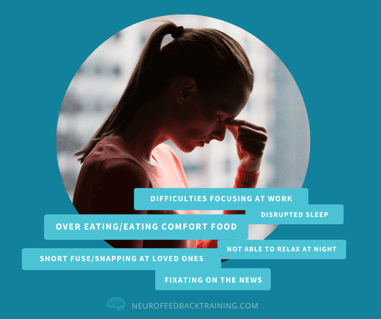 Signs of increased stress
Signs of increased stress
- Disrupted sleep. Waking up in the middle of the night, having a hard time going back to sleep, and waking up exhausted or anxious.
- Snapping at loved ones unexpectedly
- Overeating or eating a lot of comfort foods and sweets
- Having a hard time focusing on work, or working too much and having a hard time switching gears to relaxing
- Fixating on the news and worst-case scenarios
If you have any or all of these signs, it is time to actively shift your brain from being stuck in a stress reaction, and into regulation: calm, focus and ease.
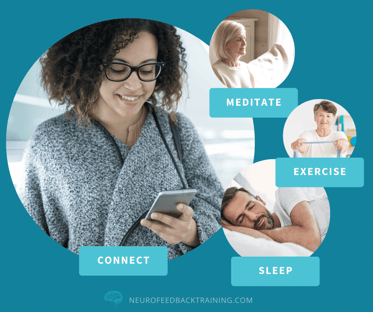 Stress Reduction - Why Is Brain Training Important For Reducing Stress?
Stress Reduction - Why Is Brain Training Important For Reducing Stress?
Brain training is the new language, like "physical fitness" and "working-out" was in the last generation, coming out of the latest health and wellness research. Brain science only in recent decades discovered the principle of neuroplasticity: the brain can change its functioning and rewire itself and reset brainwaves to the relaxation response. The relaxation response is when the brain is perceiving the environment as safe, also called the "rest and digest" response. It is when our brainwave patterns can shift most easily between states in response to our environment.
4 Reduce Stress - Essential Brain Training Tools That Can help
The stress response is habitual, so now we have to actively train our brains to re-set and regulate.
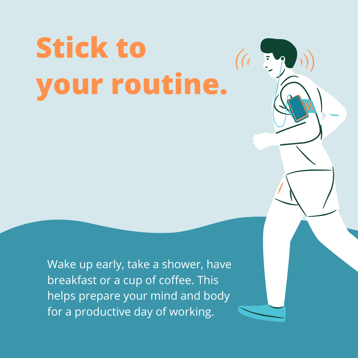
Active exercise 30 minutes a day. Hands down the research shows, cardiovascular exercise is the best way to reset your stress reaction in the present moment.
- Get outside if you can, walk, run, hike. Nature hikes are shown in research to improve mental health.
- Take a live online exercise class. Many exercise studios are offering free or low-fee group classes where you can participate from home.
2. Connect with others.
Meaningful connections with others is an important way to lower your stress. Caring for others and being cared for does lower our stress.
- Schedule a group FaceTime call with family.
- Plan a "virtual dinner party" with friends where you all get on video conference with a meal. Make it themed or dress up.
- Call someone each day whom you know lives alone or might be socially isolated.
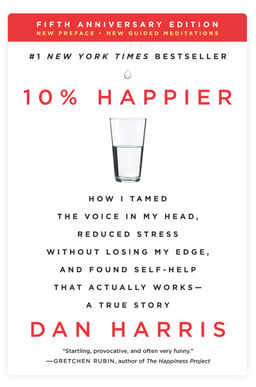
3. Practice mindfulness meditation.
Mindfulness meditation has been proven to help reduce stress. Loving-kindness and compassion-focused meditations increase empathy, boost resilience and increase individuals' sense of over all purpose. Research has shown ten minutes a day can have a significant positive impact on stress an
4. Work on your sleep hygiene (how you gear down at night and put yourself to bed.)
Many people have developed bad habits, like phones in bed, and watching upsetting or dramatic TV just before they want to be asleep. In times of stress we need to focus on good quality sleep. With appropriate expectations, you can change your sleep habits. The main reason people fail to improve their sleep is they do understand that behavior change and a long-term expectation are the keys to success. Quality sleep doesn't happen over night (pun intended).
